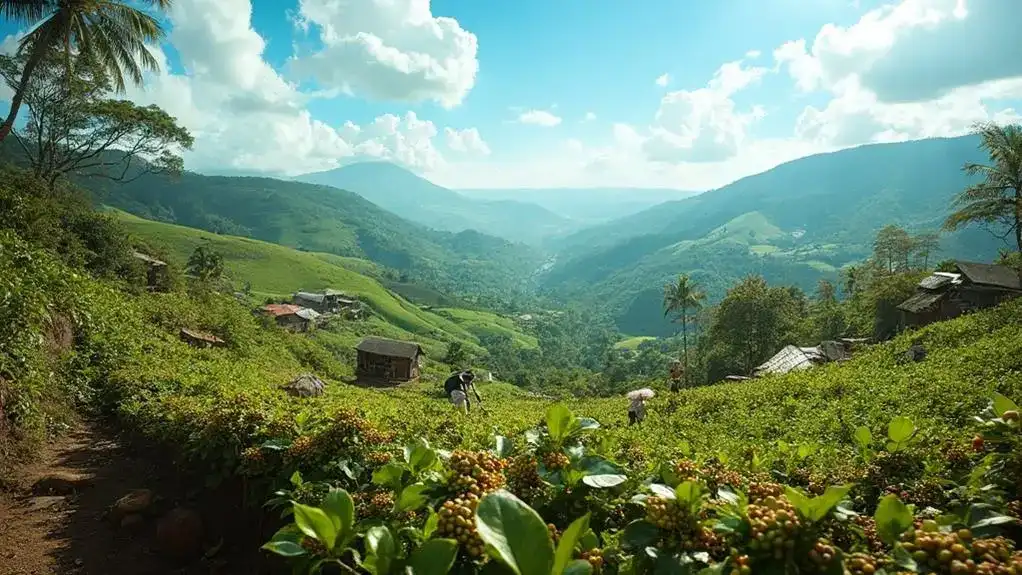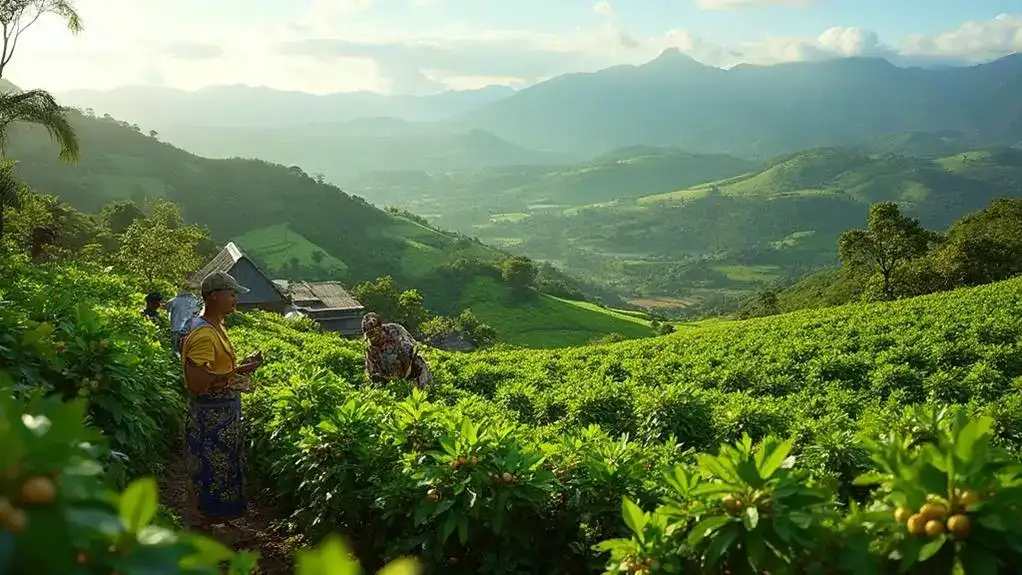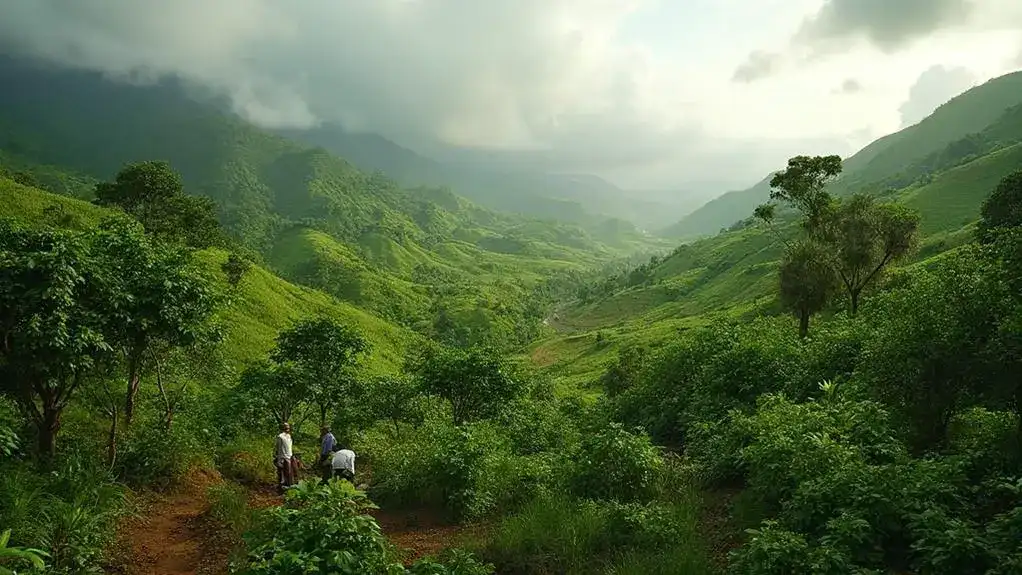Ghana’s prominent coffee growing areas include the Ashanti, Western, Eastern, Bono Ahafo, and Central regions. Each region offers unique climates and soil conditions that contribute to coffee’s variety and quality, primarily growing Arabica and Robusta beans. The Ashanti region benefits from rich volcanic soil, while the Western region, particularly Sefwi Wiawso, is known for its fertile land. The Eastern region, with farms in Akuapem and Aburi, also thrives. Other regions are increasingly recognizing coffee’s value as a cash crop, enhancing economic development. Exploring these regions reveals even more about Ghana’s significant coffee landscape.
Overview of Coffee Cultivation in Ghana

Coffee plays an essential role as a cash crop in Ghana, providing income and livelihoods for many farmers.
You’ll find primarily robusta and arabica varieties being cultivated across different regions, each offering unique flavors and qualities.
Understanding the significance of coffee in Ghana’s agricultural landscape helps you appreciate its economic impact and the diversity of coffee produced.
Importance of Coffee as a Cash Crop
As an essential cash crop, coffee cultivation in Ghana plays a significant role in boosting the agricultural economy. The coffee market has grown steadily, providing farmers with a reliable source of income.
By cultivating coffee, you not only diversify your agricultural activities but also tap into a global demand for quality beans. Coffee farming supports local economies, creating jobs and enhancing livelihoods for many families.
Additionally, government initiatives aimed at improving coffee production help farmers adopt better practices, increasing both yield and quality.
As you engage in coffee cultivation, you contribute to the sustainability of the agricultural sector, ensuring a steady flow of income while participating in a vibrant market that continues to evolve.
Types of Coffee Grown in Ghana
In Ghana, you’ll find two main types of coffee grown: Arabica and Robusta.
Arabica coffee is often cultivated in higher altitude regions, where the climate supports its nuanced flavors.
On the other hand, Robusta coffee thrives in lower elevations, making it the more common variety produced across the country.
Arabica Coffee
Many farmers in Ghana are increasingly turning their attention to Arabica coffee cultivation, recognizing its potential for higher market value compared to robusta varieties.
This shift focuses on enhancing coffee quality through better agricultural practices and suitable climatic conditions.
Arabica cultivation thrives in regions with higher altitudes and consistent rainfall, allowing farmers to produce premium beans that attract discerning buyers.
Robusta Coffee
Robusta coffee dominates Ghana’s coffee cultivation landscape, primarily thriving in regions like Ashanti, Bono Ahafo, and the Central Region.
This type of coffee is known for its resilience and adaptability, making it ideal for local farming conditions.
Farmers employ various cultivation techniques to enhance yield and quality, contributing greatly to the coffee market and providing a sustainable livelihood for many families in these regions.
What Are the Key Coffee Growing Regions in Ghana?
When exploring Ghana’s coffee landscape, you’ll find several key regions that stand out for their contributions to production.
The Ashanti, Western, Eastern, Bono Ahafo, and Central Regions each offer unique climates and soil conditions that support coffee cultivation.
Understanding these areas can give you insights into the diverse flavors and qualities of Ghanaian coffee.
Ashanti Region
In the Ashanti Region, you’ll find a variety of coffee types, primarily robusta, thriving in its rich volcanic soil.
Local farmers implement diverse farming practices that enhance yield and quality, adapting to the region’s unique climate conditions.
This combination of favorable factors positions Ashanti as a key player in Ghana’s coffee industry.
Coffee Varieties in Ashanti
Ghana’s Ashanti Region stands out for its diverse coffee varieties, primarily focusing on robusta coffee due to the region’s rich volcanic soil and favorable climate.
Local farmers benefit from:
- Enhanced coffee quality through cooperative efforts.
- Economic benefits from increased coffee production.
- Addressing farming challenges with training and support.
These factors contribute to a thriving coffee sector in Ashanti.
Farming Practices in Ashanti
Coffee farming in the Ashanti Region showcases a variety of effective practices that enhance both productivity and sustainability.
Key elements include:
- Farmer cooperatives that promote community engagement and economic empowerment.
- Crop diversification strategies to improve resilience and income.
- Sustainability practices rooted in Ashanti traditions, supported by agricultural education and local markets, ensuring quality and enhancing harvest techniques during coffee festivals.
Western Region
In the Western Region of Ghana, you’ll find key areas like Sefwi Wiawso that are significant for coffee farming.
The region enjoys a favorable climate with consistent rainfall and rich soils, making it ideal for robust coffee cultivation.
As you explore this region, you’ll see how these conditions contribute to the quality of the coffee produced.
Notable Areas in the Western Region
The Western Region stands out as a key area for coffee cultivation, featuring rich soils and a climate that supports robust coffee growth.
Here are three notable areas in the region:
- Sefwi Wiawso: Known for its fertile land.
- Berekum: Emerging coffee production zone.
- Gomoa East: Exploring coffee as an agricultural alternative.
These locations contribute greatly to the region’s coffee characteristics and overall production.
Climate Conditions
With its diverse microclimates, the Western Region offers ideal conditions for coffee cultivation. The area’s climate variability and specific rainfall patterns contribute greatly to the growth of high-quality coffee. Understanding these factors is essential for farmers aiming to enhance their yields. Here’s a quick overview of these climate conditions:
| Factor | Description | Impact on Coffee |
|---|---|---|
| Temperature | Moderate, consistent year-round | Optimal growth |
| Rainfall | Abundant, with seasonal patterns | Essential for yield |
| Humidity | High humidity levels | Affects quality |
| Elevation | Varied elevations | Influences flavor |
| Soil Type | Fertile volcanic soils | Supports growth |
Eastern Region
In the Eastern Region of Ghana, coffee farms thrive particularly in areas like Akuapem and Aburi.
These locations benefit from favorable altitudes and climate conditions that support robust coffee growth.
You’ll find that the combination of consistent rainfall and suitable elevations plays an essential role in the quality of coffee produced here.
Coffee Farms in Akuapem and Aburi
Situated in the picturesque Eastern Region, coffee farms in Akuapem and Aburi thrive thanks to their ideal climate and elevation.
These regions are known for:
- Rich volcanic soil that enhances coffee flavor.
- Consistent rainfall that supports healthy growth.
- Dedicated farmers focused on quality production.
You’ll find both Akuapem coffee and Aburi farms contributing considerably to Ghana’s coffee landscape.
Altitude and Climate Benefits
The Eastern Region of Ghana stands out for its exceptional altitude and climate, which are ideal for coffee cultivation.
Here, farmers employ effective farming techniques that enhance coffee quality. The region’s consistent rainfall and moderate temperatures create the perfect environment for robusta coffee to thrive.
Bono Ahafo Region
In the Bono Ahafo Region, you’ll find a growing interest in coffee production, particularly robusta coffee.
The region’s unique elevation and climate create favorable conditions for cultivation, making it an emerging area for coffee farming in Ghana.
As more farmers recognize the potential of this crop, they’re increasingly diversifying their agricultural practices to include coffee.
Coffee Production in Brong-Ahafo
Brong-Ahafo, known for its rich agricultural landscape, is making a name for itself in coffee production. The region’s unique climate and soil conditions boost Brong Ahafo coffee cultivation, aligning with emerging coffee farming trends. Here’s a quick look at key factors influencing coffee production in Brong-Ahafo:
| Factor | Description |
|---|---|
| Climate | Favorable rainfall and temperature |
| Soil Quality | Rich, fertile volcanic soils |
| Coffee Variety | Primarily robusta |
| Farming Methods | Smallholder farms dominate |
| Community Support | Active coffee cooperatives |
Emerging Areas for Coffee Farming
Emerging as a significant player in Ghana’s coffee landscape, the Bono Ahafo Region offers promising conditions for coffee farming.
Here are three key aspects:
- Ideal Climate: The region’s elevation and rainfall patterns create a supportive environment for coffee growth.
- Sustainability Efforts: Farmers are increasingly adopting practices focused on coffee sustainability.
- Emerging Trends: There’s a growing interest in diversifying agricultural outputs through coffee cultivation.
Central Region
In the Central Region, coffee farming initiatives are gaining momentum, greatly impacting local farmers’ economies.
By adopting improved agricultural practices, these farmers can enhance their yields and income from coffee production.
As the region embraces coffee cultivation alongside traditional crops, it fosters both economic growth and agricultural diversity.
Coffee Farming Initiatives
The Central Region of Ghana is a key player in the country’s coffee farming initiatives, attracting attention for its potential to boost local economies.
Here are three significant aspects:
- Improved farmer training enhances coffee quality.
- Adoption of sustainable agricultural practices increases yield.
- Local cooperatives promote collaborative marketing efforts.
These initiatives are essential for empowering farmers and ensuring a thriving coffee industry in the region.
Economic Impact on Local Farmers
While exploring the economic impact of coffee farming, you’ll find that the Central Region of Ghana plays an essential role in supporting local farmers.
By fostering farmer cooperatives, this region enhances economic sustainability, allowing farmers to share resources and improve their practices.
As coffee cultivation expands, local communities benefit from increased income and opportunities, contributing to the overall agricultural landscape of Ghana.
Volta Region
In the Volta Region, coffee farming is steadily expanding as local farmers embrace this lucrative crop.
Government initiatives are playing a vital role in supporting this growth, providing resources and training to enhance production.
As a result, you’ll find more farmers in this area looking to boost their income through coffee cultivation.
Expansion of Coffee Farming
Coffee farming is steadily expanding in the Volta Region, where local farmers are increasingly recognizing its potential as a lucrative cash crop.
This growth is driven by:
- Rising coffee market trends highlighting demand.
- Enhanced coffee export potential attracting investment.
- Support from local organizations promoting sustainable practices.
With these factors in play, the Volta Region is becoming a significant player in Ghana’s coffee landscape.
Support from Government Initiatives
Government initiatives play a significant role in supporting coffee farming in the Volta Region.
With government support, local farmers receive essential resources and training through various coffee initiatives. These programs aim to enhance production, improve quality, and provide technical assistance.
As a result, farmers in the Volta Region can better develop their coffee farms, contributing to both their livelihoods and the national coffee sector.
Northern Region
In the Northern Region, there’s a growing interest in coffee cultivation due to its potential for diverse agricultural outputs.
However, farmers face several challenges, including unsuitable climatic conditions and limited resources.
Understanding these factors is key to exploring how coffee farming can develop in this region.
Potential for Coffee Cultivation
Emerging as a promising area for coffee cultivation, the Northern Region of Ghana presents unique opportunities for farmers willing to diversify their crops. By tapping into this potential, you can contribute to the region’s coffee heritage while fostering economic diversification. Below is a summary of key factors influencing coffee cultivation in the Northern Region:
| Factor | Description | Impact |
|---|---|---|
| Climate | Favorable for coffee growth | Enhances quality |
| Soil Quality | Fertile and rich | Boosts yield |
| Farmer Interest | Increasing among locals | Supports economy |
| Government Support | Initiatives for farmers | Promotes sustainability |
| Market Potential | Growing domestic demand | Encourages investment |
Challenges Faced
While the Northern Region of Ghana holds promise for coffee cultivation, several challenges can hinder its growth.
You may encounter:
- Climate challenges: Inconsistent rainfall and temperature fluctuations can impact coffee quality and yield.
- Market access: Limited infrastructure makes it tough for farmers to reach larger markets.
- Lack of resources: Many farmers struggle with insufficient training and financial support for better farming practices.
Ghana Coffee Cultivation Practices

When you’re exploring coffee cultivation practices in Ghana, you’ll find that smallholder farms play a significant role in the industry.
These farms, often ranging from half an acre to 1.5 acres, allow families to engage in coffee farming while implementing sustainable practices.
Smallholder Farms
In Ghana, smallholder farms play an essential role in coffee cultivation, with average farm sizes typically ranging from half an acre to 1.5 acres.
These farms not only support local economies but also provide livelihoods for many families engaged in coffee farming.
Average Farm Sizes
Smallholder farms play an essential role in Ghana’s coffee cultivation, with average farm sizes typically ranging from half an acre to 1.5 acres.
These small plots are vital for maintaining local economies and enhancing coffee yield.
Even with limited space, farmers employ efficient practices to maximize production, ensuring that their contributions considerably impact the overall coffee industry in Ghana.
Role of Smallholder Farmers
Farmers on smallholdings are at the heart of Ghana’s coffee cultivation practices. They face smallholder challenges but often thrive through collaboration.
Key aspects include:
- Farmer cooperatives that share resources and knowledge.
- Adoption of improved farming techniques to enhance yield.
- Community support systems fostering resilience.
These elements empower smallholder farmers, ensuring their essential role in sustaining Ghana’s coffee industry.
Sustainable Farming Practices
When it comes to sustainable coffee farming in Ghana, organic production practices are gaining traction among local farmers.
You’ll find that many communities are actively engaging in sustainability efforts, sharing knowledge and resources to enhance their coffee quality and environmental impact.
Organic Coffee Production
As coffee cultivation evolves in Ghana, organic coffee production is gaining momentum, reflecting a growing awareness of sustainable farming practices.
Farmers are increasingly adopting sustainable practices to enhance soil health and protect ecosystems. By seeking organic certification, they can access premium markets, ensuring higher prices for their products.
This shift not only benefits the farmers but also promotes environmental sustainability in the coffee industry.
Community Engagement in Sustainability
Community engagement plays an essential role in promoting sustainability within Ghana’s coffee cultivation practices. By involving local communities, farmers can enhance their sustainable practices and create a positive community impact.
Key strategies include:
- Training programs on eco-friendly farming techniques.
- Establishing cooperatives for resource sharing.
- Engaging in local initiatives to preserve biodiversity.
These efforts guarantee that coffee farming supports both the environment and local livelihoods.
What Support and Development Initiatives Exist for Coffee in Ghana?
In Ghana, various support and development initiatives aim to boost coffee production and quality.
The government actively provides resources, such as free seedlings and technical training, while cooperatives enhance farmers’ ability to share knowledge and market their coffee effectively.
Government Initiatives
The Ghanaian government actively supports coffee farmers through initiatives like distributing free seedlings to boost production.
Additionally, COCOBOD provides essential technical support, helping farmers improve their growing techniques and overall yield.
These efforts aim to strengthen the coffee sector and enhance the livelihoods of those involved in coffee cultivation.
Distribution of Seedlings
Support for coffee farmers in Ghana includes an extensive seedling distribution initiative aimed at boosting production.
This initiative fosters agricultural partnerships that benefit local communities.
Key aspects include:
- Providing free seedlings to farmers in coffee-growing regions.
- Collaborating with agricultural organizations for better outreach.
- Promoting sustainable practices to enhance coffee quality and yield.
These efforts help guarantee a thriving coffee industry in Ghana.
Technical Support from COCOBOD
COCOBOD plays an essential role in enhancing coffee farming in Ghana through various technical support initiatives.
Here are three key areas of focus:
- Promoting sustainable practices to guarantee environmental health.
- Supporting farmer cooperatives for resource sharing and improved market access.
- Providing training programs that equip farmers with modern agricultural techniques.
These efforts aim to boost coffee production and improve farmers’ livelihoods across the country.
Role of Cooperatives
Coffee cooperatives play a crucial role in supporting farmers in Ghana by providing access to resources and training.
They enable collective marketing strategies, which help smallholder farmers achieve better prices for their coffee.
Benefits of Coffee Cooperatives
Cooperatives play an essential role in enhancing the livelihoods of coffee farmers in Ghana.
They provide significant cooperative benefits through:
- Resource sharing: Farmers collaborate to access tools and inputs, reducing costs.
- Training programs: Cooperatives offer education on best practices, improving yields.
- Market access: By working together, farmers can negotiate better prices for their coffee, ensuring fair compensation.
Collective Marketing Strategies
Farmers in Ghana benefit greatly from collective marketing strategies that cooperatives implement. These strategies enhance coffee quality and market access, promoting fair pricing.
Key aspects include:
- Agricultural Training: Cooperatives provide essential training to improve farming practices.
- Community Engagement: Farmers collaborate, sharing resources and knowledge.
- Pricing Strategies: Cooperatives negotiate better prices, ensuring fair compensation for farmers.
These cooperative benefits strengthen the coffee industry in Ghana.
What Challenges Are Faced in Ghana Coffee Production?

When you think about coffee production in Ghana, quality issues and climate change are two significant challenges you can’t overlook.
Farmers often face problems with pests and diseases that affect the quality of their coffee beans.
Additionally, changing weather patterns threaten the consistency of coffee yields, making it harder for producers to plan effectively.
Quality Issues
In Ghana, coffee production faces significant quality challenges, primarily due to insect infestations that can damage crops.
Many farmers lack sufficient training and education on effective pest management and harvesting techniques, which can impact the quality of the final product.
Addressing these issues through targeted training programs is essential for improving coffee quality and ensuring a sustainable future for producers.
Insect Infestations
Despite the promising potential of coffee production in Ghana, insect infestations pose a significant threat to quality.
Farmers face challenges in maintaining crop health, leading to decreased yields and compromised flavors. Effective pest management strategies, including regular monitoring and crop rotation, are essential.
Training and Education for Farmers
Effective pest management isn’t the only challenge facing coffee farmers in Ghana; the need for proper training and education is equally pressing.
To enhance coffee quality, farmers should focus on:
- Participating in farmer workshops for hands-on learning.
- Accessing educational resources on best practices.
- Collaborating with agricultural experts for ongoing support.
These steps can greatly improve their production techniques and overall coffee quality.
Climate Change Impacts
Climate change poses significant challenges to coffee production in Ghana, affecting factors like rainfall patterns and temperature.
You’ll find that farmers are increasingly adopting various adaptation strategies, such as using drought-resistant coffee varieties and adjusting planting schedules.
These efforts aim to mitigate the impact of changing climate conditions and sustain coffee yields in the face of uncertainty.
Adaptation Strategies
Often, coffee farmers in Ghana face significant challenges due to climate change impacts, which include rising temperatures, erratic rainfall, and increased pest infestations.
To build farming resilience, you can consider these adaptation strategies:
- Implementing shade-grown coffee techniques.
- Diversifying crops to reduce risk.
- Adopting pest-resistant coffee varieties.
These coffee adaptation methods can help secure your livelihood and guarantee sustainable production.
What Are the Future Prospects for Coffee in Ghana?
Looking ahead, the future of coffee in Ghana appears bright with ongoing research and development aimed at introducing high-yield varieties.
You’re likely to see a growing domestic market as more urban consumers seek out locally produced coffee, boosting farmer incomes.
Additionally, sustainability efforts are gaining traction, ensuring that coffee farming can thrive while protecting the environment.
Research and Development
In Ghana, the future of coffee farming looks bright thanks to ongoing research focused on high-yield coffee varieties and improved farming techniques.
You’ll find that these advancements can substantially boost productivity and enhance the quality of coffee produced.
As more farmers adopt these innovations, the potential for Ghana’s coffee industry to thrive continues to grow.
High-Yield Coffee Varieties
Recent advancements in research and development are paving the way for high-yield coffee varieties in Ghana, which could markedly boost production.
Here are three key points to evaluate:
- High yield techniques improve overall farming efficiency.
- Coffee genetics play an essential role in developing resilient plants.
- Enhanced varieties can considerably increase farmer incomes, making coffee a more viable cash crop for many.
Improved Farming Techniques
Improved farming techniques are essential for the future of coffee production in Ghana, as they directly impact yield, quality, and farmer livelihoods.
Here are a few key aspects to take into account:
- Sustainable practices enhance soil health and reduce chemical use.
- Training programs help farmers adopt better harvesting and processing methods.
- Innovation in irrigation supports consistent water supply, improving coffee quality.
Domestic Market Growth
As you explore the future prospects for coffee in Ghana, you’ll notice a significant rise in local consumption, particularly in urban areas like Accra.
Coffee festivals and cultural events are also gaining popularity, promoting the beverage and showcasing its importance in Ghanaian culture.
These trends suggest a promising growth trajectory for the domestic coffee market, encouraging more farmers to engage in coffee cultivation.
Increasing Local Consumption
With the rising popularity of coffee in urban areas like Accra, Ghana’s domestic market is poised for significant growth.
To understand this trend, consider:
- Increased awareness of local coffee benefits.
- The emergence of coffee shops and cafes.
- A shift in consumption trends toward specialty coffee.
As a result, more farmers are likely to engage in coffee cultivation, meeting growing demand.
Coffee Festivals and Cultural Events
Coffee festivals and cultural events are becoming central to promoting Ghana’s burgeoning coffee scene.
These gatherings not only celebrate the rich heritage of coffee but also foster domestic market growth.
Here are three highlights you can expect:
- Coffee tastings showcasing local varieties.
- Workshops on coffee cultivation and processing.
- Cultural performances reflecting the community’s traditions.
These events play a vital role in enhancing awareness and appreciation for Ghanaian coffee.
Sustainability Efforts
When considering the future of coffee in Ghana, it’s crucial to look at sustainability efforts like agroforestry practices and environmental protection initiatives.
These approaches not only help maintain healthy ecosystems but also enhance the quality of coffee production.
Agroforestry Practices
Agroforestry practices are gaining traction in Ghana as farmers seek sustainable methods for coffee production.
These practices not only enhance coffee yield but also support environmental health.
Consider these agroforestry benefits:
- Increases biodiversity by integrating trees with coffee plants.
- Improves soil health and moisture retention.
- Provides additional income through timber and fruit.
Environmental Protection Initiatives
As farmers in Ghana gear up to tackle environmental challenges, various initiatives are paving the way for sustainable coffee production.
You’ll find that:
- Sustainable practices are being adopted to minimize chemical use.
- Reforestation efforts protect local ecosystems.
- Training programs educate farmers on environmental conservation techniques.
These steps are essential for ensuring the future of coffee farming while preserving the environment for generations to come.
Conclusion
To sum up, Ghana’s coffee landscape is a vibrant tapestry woven from diverse regions, each contributing its unique flavor to the nation’s coffee story. As farmers adopt new practices and embrace community-driven initiatives, the future looks promising. While challenges remain, the support from various sectors paves the way for growth and innovation. With the right nurturing, Ghana’s coffee industry can continue to flourish, offering rich brews that reflect the heart and soul of its land.

